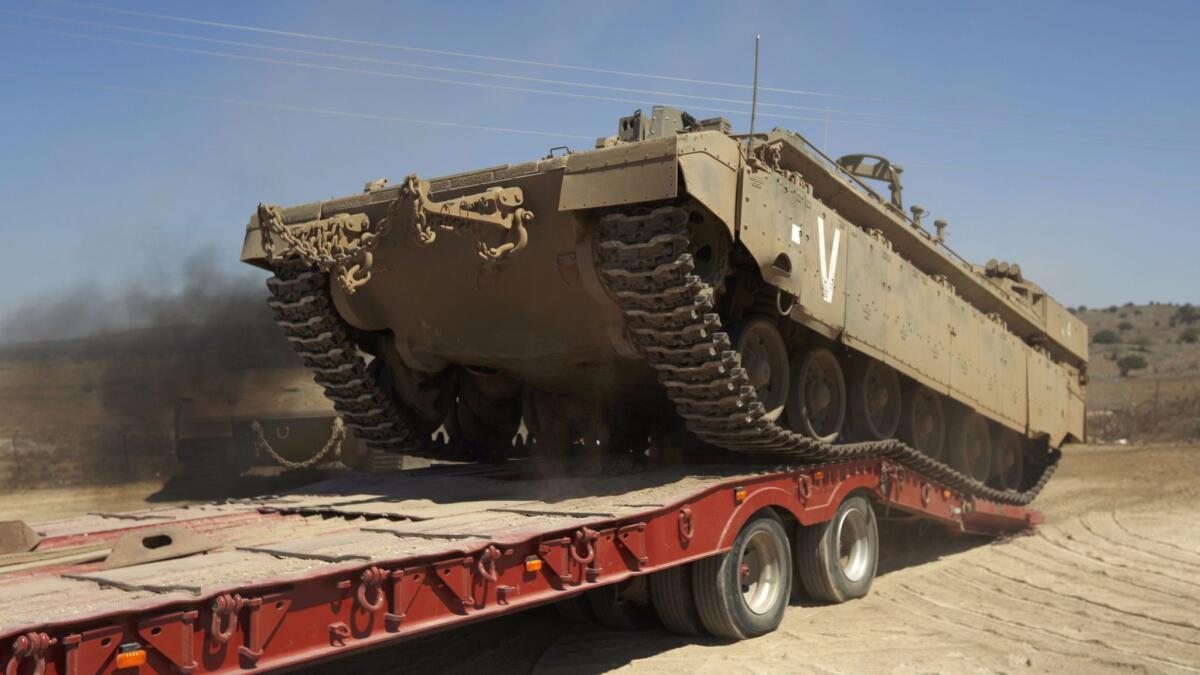Site targeted by Israeli airstrike in Syria may have produced chemical weapons

- Share via
Reporting from BEIRUT — Israeli airstrikes on Syria have become almost a matter of routine: Israel fires missiles on a target; Syria condemns the attack; Israel stays mum, neither acknowledging nor denying responsibility.
Little seemed outwardly different Thursday, when Syria accused Israel of sneaking warplanes into Lebanese airspace, then firing missiles at a military outpost near the town of Masyaf in western Syria.
The choice of target, however, which included a military scientific research center, made the attack anything but routine, analysts said.
“It’s another level of interfering,” said Maj. Gen. Yaakov Amidror, a former national security advisor to Israeli Prime Minister Benjamin Netanyahu, according to the transcript of a conference call with journalists Thursday.
“It’s the first time that the target which was attacked is a formal Syrian facility — not just a warehouse but the center of research and development,” he added.
He also said it was probably responsible for producing chemical weapons and “many other weapons systems, including rockets and missiles.”
The attack, which occurred at 2:42 a.m., according to a statement from the Syrian army’s general command, killed two soldiers and caused “material damage to the site.”
Warning of “dangerous repercussions of such hostile acts on the security and stability of the region,” the statement said the Israeli attack had been a “desperate attempt to raise the morale” of Islamic State fighters.
Damascus has long accused its regional and international enemies, including Israel, of supporting militants in the country. Israel has, at the least, offered medical assistance and nonlethal aid to Syrian rebels.
The Syrian Observatory for Human Rights, a Britain-based monitoring group that supports the opposition against Syrian President Bashar Assad, said that the Israeli barrage had struck a military base, a store for medium- and short-range missiles and a scientific research center.
It put the casualty toll at seven.
Once again, Israeli did not comment on the strike, maintaining its public position of neutrality in the civil war raging across Syria.
Yet Amos Yadlin, former head of Israel’s military intelligence, tweeted that the strike was “not routine.”
He claimed that the Masyaf site was a center for development and manufacture of “precision missiles which will have a significant role in the next round of conflict,” and that the factory there produced chemical weapons as well as barrel bombs, primitive explosives the government has used against its rebel adversaries.
Damascus has been accused of deploying chemical weapons against the opposition. A U.N. report on Wednesday blamed the Syrian government for a sarin attack in April on the northern town of Khan Sheikhoun that killed dozens of civilians.
Israeli officials, including Netanyahu, have acknowledged strikes in Syria in the past; they say such action is aimed at preventing arms transfers to Hezbollah, the Lebanese Shiite Muslim militant faction that has become Israel’s nemesis since 2006, when it fought Israel to a bloody stalemate. The group is now a vital battlefield ally of Assad, and, along with its patron Iran, enjoys unprecedented influence in Syria.
Hezbollah’s growing role in Syria has raised alarm in Israel. It fears that Hezbollah’s presence in Syria has given the group access to advanced weapons from Iran as well as Russia, Assad’s top international backer.
Israel has been preparing itself for another round of war with Hezbollah. This week, the Israeli army is conducting its largest drill in more than a decade. It will include, according to the Israeli newspaper Haaretz, a scenario of instant escalation, in which Israeli units defend against “multiple terrorist infiltrations in the north.”
But the strike also comes as a delicate cease-fire has taken hold between Damascus and rebels operating in southern Syria. The agreement, brokered by the U.S., Russia and Jordan, was rejected by Israel because it did not stipulate the removal of Hezbollah and Iranian-backed militias from Syria.
The attack, wrote Amos Harel, Haaretz’s military and defense analyst, “may be interpreted as an Israeli signal of sorts to the world powers: You still need to take our security interests in[to] account.”
“We’re capable of disrupting the process of a future settlement in Syria if you insist on leaving us out of the picture,” he said.
Special correspondents Bulos and Tarnopolsky reported from Beirut and Jerusalem, respectively.
UPDATES:
3:55 p.m.: This article has been updated throughout with staff reporting.
This article was originally posted at 4:45 a.m.
More to Read
Sign up for Essential California
The most important California stories and recommendations in your inbox every morning.
You may occasionally receive promotional content from the Los Angeles Times.














